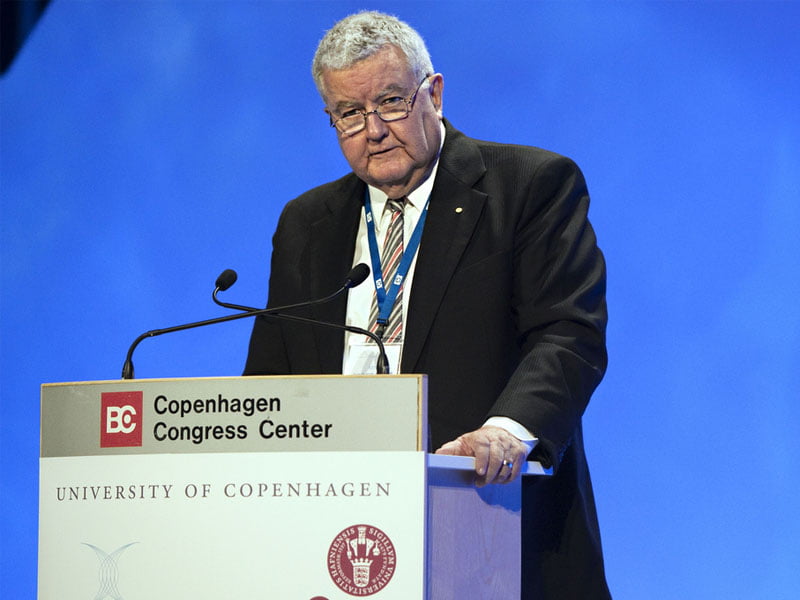The nation’s Chief Scientist Ian Chubb has been busy. He has been talking up the need for a national strategy on improving STEM capabilities in Australia since he was appointed to the role in 2011.
Today at the National Press Club in Canberra, he launched a paper – ‘STEM in the national interest’– urging a strategic approach to Science, Technology, Engineering and Mathematics in Australia.
Prof Chubb clearly believes Australia is heading toward crisis in relation to its production of STEM skills. We simply don’t have a plan.

Although Australia is not yet an embarrassment – our relative scientific output is not far off the top grouping of STEM-heavy countries – we are not nearly as good as we like to think we are.
And our educational infrastructure, from kindergarten through secondary schools to universities, is in need of renewal. We are not growing in this area as fast as our global competitors, and this means we are falling off the back of that lead group.
Professor Chubb is a great advocate in this area. He quotes report after report that has identified significant problems in Australia’s STEM ecosystem.
A report by the Australian Council of Learned Academies (ACOLA) summarises the overall position best: “Most nations are closely focused on advancing STEM, and some have evolved dynamic, potent and productive strategies. In world terms, Australia is positioned not far below the top group, but lacks the national urgency found in the United States, East Asia and much of Western Europe, and runs the risk of being left behind.”
Professor Chubb says: “It should be clear. This is no world for the lethargic. No world for the complacent. No world for the unambitious. We need to act.”
I have been writing a lot in this area lately – because so many different advocacy groups have been pressing the issue. And they are each supporting eachother.
Professor Chubb today endorsed calls from the Business Council of Australia for the creation of a National Innovation Council. And the BCA (which launched its pre-election economic action plan today) endorsed Professor Chubb’s STEM strategic paper.
Prof Chubb wants what we all want: A national strategy, directed from the top. This is understandable – the countries that have made this a priority are the countries that are increasing their STEM capability.
And this includes the US, still the biggest technology powerhouse on the planet.
Ten years ago, (the US) established the National Science and Technology Council, which is a Cabinet-level Council chaired by the President, the membership of which includes the Vice-President, the Director of Office of Science and Technology Policy, Cabinet Secretaries, Agency heads and other officials,” Prof Chubb said.
The council is the ” principal means within the executive branch to coordinate science and technology policy across the diverse entities that make up the Federal research and development enterprise,” he said.
“(It) prepares research and development strategies that are coordinated across Federal agencies to form investment packages aimed at accomplishing multiple national goals.”
And this is what he has in mind for Australia, suggesting that the Prime Minister’s Science Engineering and Innovation Council (PMSEIC), could be structured and referenced to undertake the role if there is no wish to create a new body.
Prof Chubb will release a plan for tweaking PMSEIC to get a better result.
Tweaking will not get us to where we want to be.
The Chief Scientist would know better, I am sure, but respectfully, the PMSEIC has been around since 1998. It’s composition needs to be changed, and whatever urgency Prof Chubb says the issue needs, he won’t find it on that council.
It is the same with the BCA’s proposed National Innovation Council, which is a good idea, although its aims and ambitions need adjustment.
I will be writing about the BCA’s epic plan for the economy in the coming days.
In the meantime, I came across some remarks that Ian Chubb made at a conference in Perth a couple of weeks ago that resonated.
I am very conscious that we don’t throw the baby out with the bathwater when we talk about how we boost Australia’s innovation industries. Because there really is a lot that we do well in this country.
But we do need a reality check occasionally.
Here’s a reality check from Prof Chubb:
“We have to get beyond accepting our own rhetoric about our excellence, and bring forward evidence.
“Oscar Wilde might have got away with it when he is reputed to have told a US customs officer that he had nothing to declare but my genius. He got away with it. We can’t.
“Our national equivalent to Wilde’s comment is that we ‘punch above our weight’ in research. We are told that we are above world standard in nearly every field. That our 0.3% of the world’s population produces 3% of the research outputs. So we nod wisely – and feel good and don’t ask about the weight class we are in.
“We don’t challenge the value of a standard where most of the world’s population is in countries where there is little to no research. In other words, we may be too willing to find the right denominator – and ‘right’ means one that doesn’t affect the numerator too much.
“I argue that is not good enough.
“We can’t just float like butterflies. We need also to sting like bees.”
Photo Credit: by Lizette Kabré, University of Copenhagen http://bit.ly/1L07IBU
Do you know more? Contact James Riley via Email.

